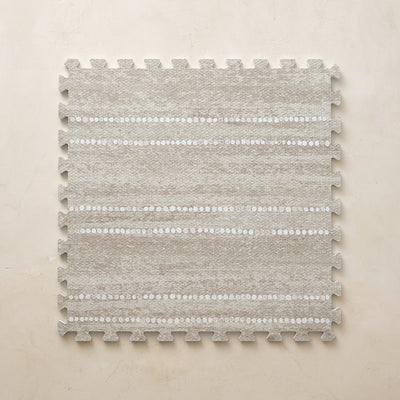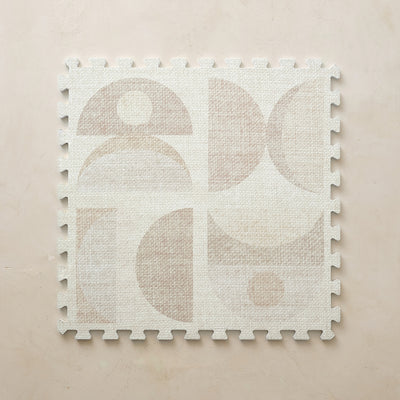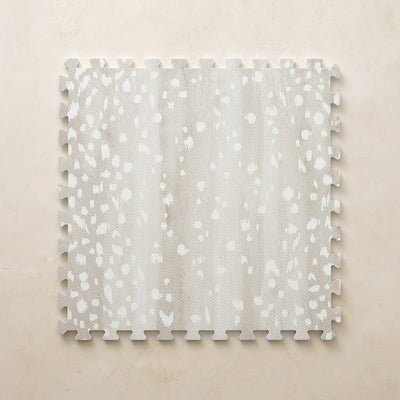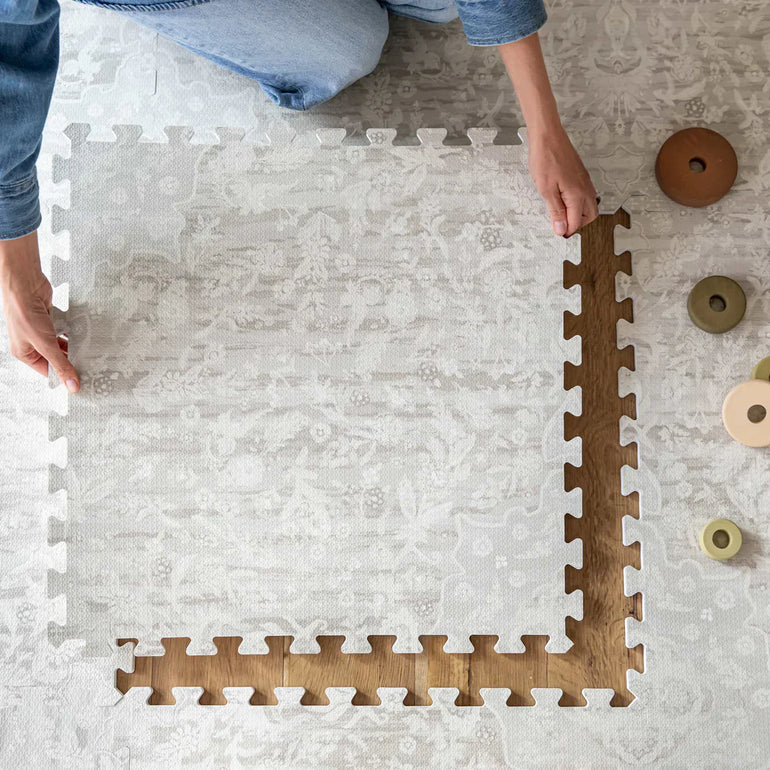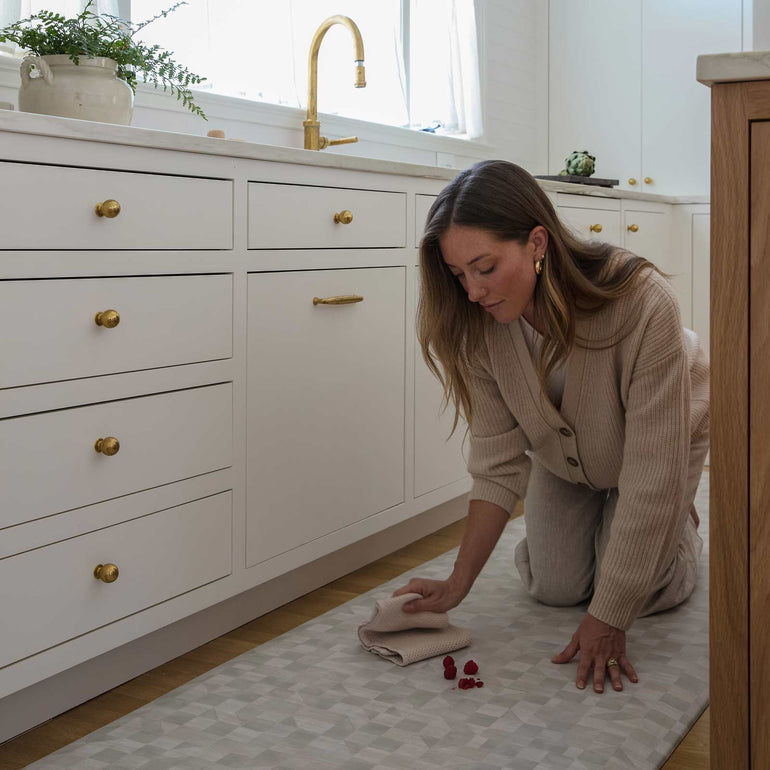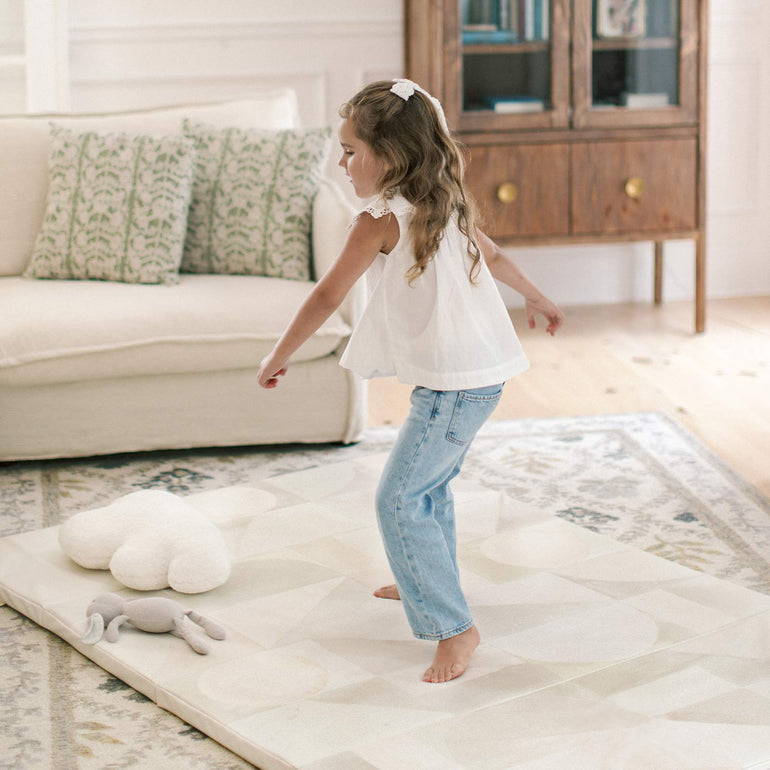
Floor time play is one of the most effective ways to nurture early baby development [1]. Through simple, intentional activities on the floor, infants build strength, coordination, and critical skills that support every stage of growth. Gross motor activities for infants, fine motor activities, and sensory exploration all begin in a safe, soft, and stimulating floor play environment. With the right space and the right floor play ideas, families can turn everyday moments into powerful developmental experiences.
Why Developmental Activities Are Essential for Infant Growth
The early months and years are a period of rapid change. During this time, developmental activities for infants help lay the groundwork for the skills they will use throughout their lives. [2]. Floor play activities like reaching, rolling, grasping, and crawling build strength in large and small muscles. They also develop hand-eye coordination, visual motor skills, and confidence in movement.
These early experiences support the development of both gross and fine motor skills by encouraging babies to explore, balance, and interact with their environment [3]. Floor play also promotes essential social and emotional growth as babies learn to respond to sounds, faces, and playful interactions. Providing a safe, supportive space for these activities is essential for giving infants the freedom to move, try, and learn.
Gross Motor Activities for Infants That Build Strength and Coordination
Helping infants develop their large muscles through gross motor skill activities sets the stage for crawling, sitting, standing, and eventually walking. These activities focus on strengthening the core, arms, and legs, allowing babies to move confidently across their environment.
Muscle Development Through Movement
Simple floor-time activities, such as tummy time, reaching for toys, and gentle supported sitting, encourage babies to engage their large muscles. Tummy time, in particular, is one of the most effective ways to build strength in the neck, back, and shoulders. It also teaches babies how to push up on their hands and knees, an essential milestone for future crawling.
Rolling over is another valuable gross motor activity that helps babies coordinate their bodies and build the strength needed for more advanced movements. To support these activities, having a soft, cushioned surface is essential. Play mats designed for infants provide a safe, easy-to-clean foundation where babies can explore and develop their gross motor skills with confidence.
Setting Up a Safe Floor Play Area for Active Exploration
Creating a comfortable, open floor space encourages babies to move freely and try new skills. A well-designed play area should feature soft, supportive surfaces, age-appropriate toys, and ample space for movement. Incorporating tumbling mats adds extra versatility, offering padded support for active babies as they practice crawling, rolling, and early standing.
Having a dedicated floor play area helps promote regular, spontaneous play activities that build coordination and strengthen the connection between movement and confidence.
Fine Motor Activities for Infants to Strengthen Hands and Fingers
While large muscle development is important, the development of fine motor skills is equally critical during infancy. Fine motor activities for infants focus on building strength and control in the hands and fingers, setting the stage for skills like self-feeding, dressing, and writing later on [4].
Encouraging Grasping, Reaching, and Hand-Eye Coordination
During floor play, encouraging babies to reach for small objects, such as rattles or soft blocks, helps develop their fine motor skills naturally. Offering toys in different shapes and textures promotes better grip strength and improves hand control. Over time, these activities enhance both hand and visual motor coordination, helping babies learn how to track objects, reach accurately, and manipulate toys with purpose.

When babies engage their hands and fingers during play, they are building crucial connections in the brain that support learning and independence. Having a safe, inviting surface for this kind of exploration is important. Spaces set up with soft, modular furniture provide babies with sturdy yet cushioned areas where they can practice climbing, reaching, and balancing, thereby further boosting their fine motor development.
Play Activities That Promote Visual-Motor Development
Simple games, such as moving toys just out of reach, encouraging babies to crawl toward a favorite item, or playing peek-a-boo with soft cloths, help promote visual-motor skills. Singing songs during playtime can also add layers of interaction that support both cognitive and motor growth. Songs with gestures encourage babies to watch, imitate, and move their hands purposefully, thereby reinforcing the development of fine motor skills while enhancing social bonding.
Offering a mix of textures, colors, and sounds during floor play keeps babies engaged and motivated to interact with their environment. Consistent exposure to these play ideas strengthens both small muscles and the larger coordination systems needed for more complex movements later on [5].
Building a Strong Foundation Through Floor Play
Floor play is one of the first ways babies discover their strength, curiosity, and independence. Each reach, roll, and stretch across a soft surface strengthens large muscles, refines hand-eye coordination, and builds confidence in new movements. Gross motor activities for infants and fine motor activities lay the foundation for problem-solving, communication, and resilience later in life.
Creating a thoughtful space for play matters. A supportive foundation, like a cushioned play mat allows babies to explore freely while staying safe and comfortable. When the environment encourages motion and exploration, every simple action, from grabbing small objects to balancing on hands and knees, becomes part of a bigger journey of discovery.
Floor play is not just about physical milestones; it's also about emotional milestones. It's about giving babies the space to wonder, try, and grow. Every playful moment builds more than muscles; it shapes the way a child approaches the world for years to come.
Citations:
[1] What is Floortime? - https://www.autismspeaks.org/dir-floortime
[2] The Power of Play: A Pediatric Role in Enhancing Development in Young Children - https://publications.aap.org/pediatrics/article/142/3/e20182058/38649/The-Power-of-Play-A-Pediatric-Role-in-Enhancing
[3] Movement and play: babies - https://raisingchildren.net.au/babies/play-learning/play-baby-development/movement-play-babies
[4] The Importance of Fine Motor Skill Development - https://penfieldchildren.org/kohls-building-blocks/developmental-milestones/importance-fine-motor-skill-development/
[5] Developing motor skills - https://earlychildhood.qld.gov.au/early-years/early-learning-at-home/play/developing-motor-skills
